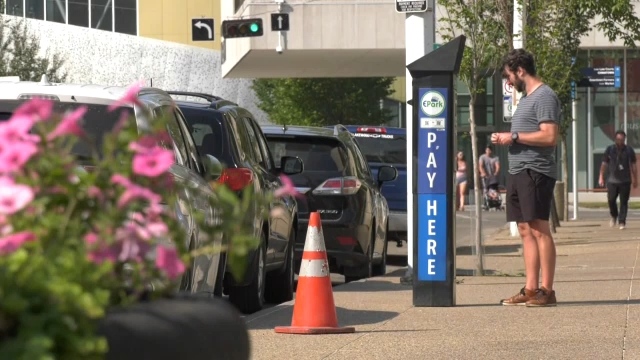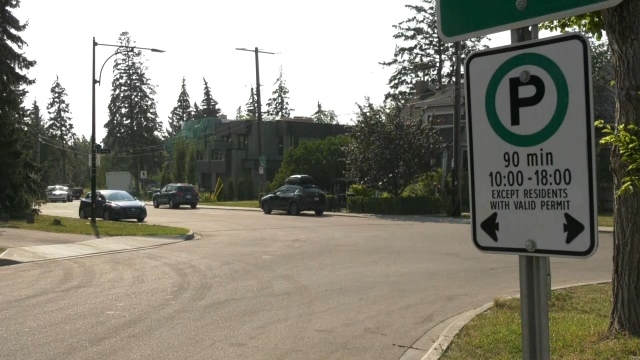Price increases, residential permits part of city's plan to manage parking in the future
 Cars parked on downtown Edmonton street.
Cars parked on downtown Edmonton street.
The city is taking a long-term look at how it manages parking in business and residential areas.
“We have to have something that we can tell communities to give them reassurance. Right now, we deal with parking afterwards, when it becomes an issue,” said Sarah Hamilton, sipiwiyiniwak ward councillor.
The plan, presented to councillors on Tuesday, includes seven actions. The first three will be given priority:
- Develop guidelines for the use of public curbside space and make amendments to any relevant city policies, guidelines or bylaws, as well as design and construction standards.
- Review on and off-street parking fees. The report suggested increasing rates and shorter parking windows in high demand areas could result in higher turnover.
- Modernize the city’s existing residential parking program.
“Those parking programs aren’t unified, they’re not united so what happens in the University area for instance or Windsor Park is different than what happens in the Coliseum area,” Hamilton added.

The plan would also look to address congestion and lack of on-street parking in neighbourhoods, potentially leading to more residential neighbourhood parking programs with annual fees for permits.
“You go in through the new subdivisions and not only are the streets narrower, but you don’t have front yards that are easy to park in front of,” said Hamilton.
“They get fed up and then you get full on parking programs.”
The remaining actions include providing more accessible parking spots and what’s called “parking benefit districts,” where parking fees would be re-invested into amenities in the areas where the fees were collected.
Hamilton acknowledged some changes could make it difficult for Edmontonians with limited financial means, but noted no changes were made immediately.
“This is about setting the course that will determine those next five to seven years,” she said.
With files from CTV Edmonton’s Jeremy Thompson
CTVNews.ca Top Stories

Trump threatens to try to take back the Panama Canal. Panama's president balks at the suggestion
Donald Trump suggested Sunday that his new administration could try to regain control of the Panama Canal that the United States “foolishly” ceded to its Central American ally, contending that shippers are charged “ridiculous” fees to pass through the vital transportation channel linking the Atlantic and Pacific Oceans.
Man handed 5th distracted driving charge for using cell phone on Hwy. 417 in Ottawa
An Ottawa driver was charged for using a cell phone behind the wheel on Sunday, the fifth time he has faced distracted driving charges.
Wrongfully convicted N.B. man has mixed feelings since exoneration
Robert Mailman, 76, was exonerated on Jan. 4 of a 1983 murder for which he and his friend Walter Gillespie served lengthy prison terms.
What's open and closed over the holidays in Canada
As Canadians take time off to celebrate the holidays, many federal offices, stores and businesses will be closed across the country on Christmas Day and New Year's Day.
Can the Governor General do what Pierre Poilievre is asking? This expert says no
A historically difficult week for Prime Minister Justin Trudeau and his Liberal government ended with a renewed push from Conservative Leader Pierre Poilievre to topple this government – this time in the form a letter to the Governor General.
opinion Christmas movies for people who don't like Christmas movies
The holidays can bring up a whole gamut of emotions, not just love and goodwill. So CTV film critic Richard Crouse offers up a list of Christmas movies for people who might not enjoy traditional Christmas movies.
More than 7,000 Jeep SUVs recalled in Canada over camera display concern
A software issue potentially affecting the rearview camera display in select Jeep Wagoneer and Grand Cherokee models has prompted a recall of more than 7,000 vehicles.
'I'm still thinking pinch me': lost puppy reunited with family after five years
After almost five years of searching and never giving up hope, the Tuffin family received the best Christmas gift they could have hoped for: being reunited with their long-lost puppy.
10 hospitalized after carbon monoxide poisoning in Ottawa's east end
The Ottawa Police Service says ten people were taken to hospital, with one of them in life-threatening condition, after being exposed to carbon monoxide in the neighbourhood of Vanier on Sunday morning.

































